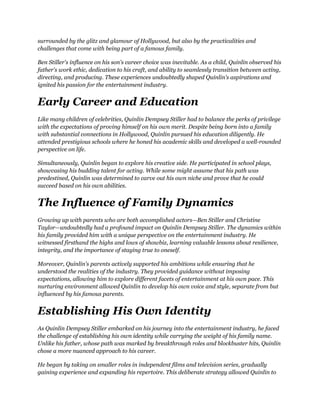Reflecting On Setbacks: A Weekly Review Of Challenges And Growth

Table of Contents
Identifying and Analyzing Your Setbacks
This section focuses on pinpointing the challenges you faced during the week. A thorough setback identification process is the first step towards effective learning and growth.
Specific Examples
To effectively conduct a challenge analysis, you need to be detailed. Don't just write "bad week." Instead, get specific.
- Missed Deadlines: Which deadlines? Why were they missed? Were there external factors, or internal issues like poor time management?
- Conflicts: With whom? What was the nature of the conflict? What was your role in the situation?
- Technical Issues: What specific technical problems did you encounter? How did they impact your work or goals?
- Personal Challenges: What personal obstacles did you face that affected your productivity or well-being? Be honest and self-reflective.
Being specific in your problem-solving approach allows you to understand the root cause of the setback, rather than just the surface-level symptoms. This detailed approach to problem identification is key to preventing similar issues in the future.
Root Cause Analysis
Delving deeper than surface-level observations is crucial for effective learning. Don't just identify the problem; understand why it happened.
- 5 Whys: Repeatedly ask "why" to uncover the underlying causes. For example: "I missed the deadline (Why?) Because I underestimated the time required (Why?) Because I didn't properly break down the task (Why?) Because I lacked a detailed project plan (Why?) Because I didn't prioritize planning effectively."
- Fishbone Diagram (Ishikawa Diagram): A visual tool to brainstorm potential causes categorized by categories like people, methods, machines, materials, environment, and measurement.
Understanding the "why" behind setbacks through thorough root cause analysis is essential for effective solution finding. This allows you to create targeted solutions and prevent similar issues from arising again.
Extracting Lessons and Growth Opportunities
This section emphasizes learning from mistakes. Remember, setbacks aren't failures; they're opportunities for personal growth.
What Did You Learn?
Focus on the positive takeaways from your challenges. Ask yourself these key questions:
- What went wrong? Be honest and objective in your assessment.
- What could I have done differently? Explore alternative approaches and strategies.
- What did I learn? Identify the key lessons and insights gained from the experience.
Self-compassion is crucial here. Avoid self-blame and focus on learning and improvement. This approach to learning from mistakes is vital for continuous self-improvement and skill development.
Actionable Steps for Improvement
Turning insights into concrete actions is key to preventing future setbacks. Develop an action plan based on your learnings.
- New skills to learn: Identify any skill gaps revealed by your setbacks. Plan to acquire these skills through courses, workshops, or mentorship.
- Process improvements: Refine your workflow or processes to address inefficiencies or weaknesses identified during your challenge analysis.
- Seeking mentorship: Connect with mentors or experienced professionals who can provide guidance and support.
Creating an improvement strategy and following through with actionable steps demonstrates commitment to personal and professional growth. This proactive approach will prevent you from repeating the same mistakes.
Building Resilience and Maintaining Momentum
This section focuses on the mental aspect of handling setbacks. Developing resilience is vital for navigating challenges effectively.
Developing a Growth Mindset
Embrace challenges as opportunities for learning and growth. A growth mindset is characterized by:
- Belief in your ability to learn and improve: You view setbacks as temporary and surmountable.
- Focus on effort and learning: You see challenges as opportunities to develop new skills and knowledge.
- Persistence in the face of adversity: You don't give up easily; you persevere and find solutions.
Cultivating resilience and a growth mindset are essential for navigating setbacks and achieving your goals. This mindset fosters self-belief and perseverance.
Celebrating Small Wins
Acknowledging progress, no matter how small, boosts morale and encourages continued effort.
- Public acknowledgment: Share your achievements with colleagues, friends, or family.
- Reward yourself: Treat yourself to something you enjoy after completing a challenging task.
- Journaling: Regularly record your successes to track your progress and build confidence.
Positive reinforcement is crucial for maintaining motivation and building self-belief. Celebrating your achievements, even small ones, will keep you motivated and focused on your goals.
Conclusion
A consistent weekly review of challenges allows for continuous personal and professional growth. By consistently identifying setbacks, analyzing root causes, extracting lessons, building resilience, and celebrating progress, you can transform obstacles into opportunities. This structured approach allows you to actively engage in challenge analysis and refine your problem-solving techniques over time.
Start your journey towards consistent self-improvement today! Implement a weekly review of challenges and transform your setbacks into powerful learning experiences. Don't let challenges define you—learn from them and grow stronger. Begin your weekly challenge review now and unlock your full potential!

Featured Posts
-
 Dashcam Reveals E Scooter On Busy Auckland Southern Motorway Section
May 17, 2025
Dashcam Reveals E Scooter On Busy Auckland Southern Motorway Section
May 17, 2025 -
 Evaluating Bayern Munichs Academy Lessons From Angelo Stillers Career Path
May 17, 2025
Evaluating Bayern Munichs Academy Lessons From Angelo Stillers Career Path
May 17, 2025 -
 Mati Donalda Trampa Khto Bula Meri Enn Maklaud
May 17, 2025
Mati Donalda Trampa Khto Bula Meri Enn Maklaud
May 17, 2025 -
 Stay Updated On The La Lakers With Vavel United States
May 17, 2025
Stay Updated On The La Lakers With Vavel United States
May 17, 2025 -
 Missed Student Loan Payments Understanding The Credit Implications
May 17, 2025
Missed Student Loan Payments Understanding The Credit Implications
May 17, 2025
